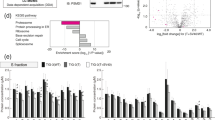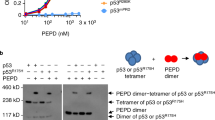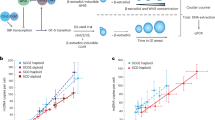Abstract
THE p53 protein is rendered temperature-sensitive by a point mutation1. Rat cells transformed by this mutant p53 and an activated ras oncogene grow well at 37°C but cease DNA synthesis and cell division when shifted to 32°C (ref. 1). Immunostaining demonstrates that the mutant p53 protein is in the nucleus of the arrested cells at 32°C but in the cytoplasm of the growing cells at 37°C. This is the first example of a protein which is temperature-sensitive for nuclear transport. The translocation from cytoplasm to nucleus and vice versa occurs 6 h after temperature shift and is coincident with the inhibition of DNA synthesis; transport from cytoplasm to nucleus does not require protein synthesis. Remarkably, inhibition of protein synthesis at 37°C also results in the rapid appearance of mutant p53 in the cell nucleus. These results suggest the presence of a short-lived protein responsible for holding p53 in the cytoplasm at 37°C but not at 32°C. Analysis of a non-temperature-sensitive mutant p53 protein shows that its cytoplasmic location is sensitive to protein synthesis inhibitors but not to temperature.
This is a preview of subscription content, access via your institution
Access options
Subscribe to this journal
Receive 51 print issues and online access
$199.00 per year
only $3.90 per issue
Buy this article
- Purchase on Springer Link
- Instant access to full article PDF
Prices may be subject to local taxes which are calculated during checkout
Similar content being viewed by others
References
Michalovitz, D., Halvey, O. & Oren, M. Cell 62, 671–680 (1990).
Yewdell, J. W., Gannon, J. V. & Lane, D. P. J. Virol. 59, 444–452 (1986).
Gannon, J. V., Greaves, R., Iggo, R. & Lane, D. P. EMBO J. 9, 1595–1602 (1990).
Finlay, C. A. et al. Molec. cell Biol. 8, 531–539 (1988).
Waseem, N. H. & Lane, D. P. J. Cell Sci. 96, 121–129 (1990).
Kenny, M. K., Schlegel, U., Furneaux, H. & Hurwitz, J. J. biol. Chem. 265, 7693–7700 (1990).
Kalderon, D., Richardson, W. D., Markham, A. F. & Smith, A. E. Nature 311, 33–38 (1984).
Dingwall, C. & Lasky, R. A. A. Rev. Cell. Biol. 2, 367–390 (1986).
Dang, C. V. & Lee, W. M. F. J. biol. Chem. 264, 18,019–18,023 (1989).
Nasmyth, K., Adolf, G., Lydall, D. & Seddon, A. Cell 62, 631–647 (1990).
Steward, R. Cell 59, 1179–1188 (1989).
Rushlow, C. A., Han, K., Manley, J. & Levine, M. Cell 59, 1165–1177 (1989).
Roth, S., Stein, D. & Nusslein-Volhard, C. Cell 59, 1189–1202 (1989).
Lenardo, M. J. & Baltimore, D. Cell 58, 227–229 (1989).
Van Etten, R. A., Jackson, P. & Baltimore, D. Cell 58, 669–678 (1989).
Oren, M., Maltzman, W. & Levine, A. J. Molec. cell Biol. 1, 101–110 (1981).
Crawford, L. V., Pim, D. C. & Lamb, P. Molec. biol. Med. 2, 261–272 (1984).
Cattoretti, G., Rilke, F., Andreola, S., D'Amato, L. & Delia, D. Int. J. Cancer 41, 178–183 (1988).
Van Den Berg, F. M. et al. J. Path. 157, 193–199 (1989).
Takahashi, T. et al. Science 246, 491–494 (1989).
Baker, J. S. et al. Science 244, 217–221 (1989).
Nigro, J. M. et al. Nature 342, 705–708 (1989).
Bartek, J., Iggo, R., Gannon, J. & Lane, D. P. Oncogene 5, 893–899 (1990).
Iggo, R., Gatter, K., Bartek, J., Lane, D. & Harris, A. L. Lancet 675–679 (1990).
Rodrigues, N. R. et al. Proc. natn. Acad. Sci. U.S.A. 87, 7555–7559 (1990).
Harlow, E. & Lane, D. Antibodies: A Laboratory Manual (Cold Spring Harbor Laboratory, New York, 1988).
Shaulsky, G., Goldfinger, N., Ben-Ze'ev, A. & Rotter, V. Molec. cell Biol. 10, 6565–6577 (1990).
Ginsberg, D., Michael-Michalovitz, D., Ginsberg, D. & Oren, M. Molec. cell. Biol. 11, 582–585 (1991).
Shaulsky, G., Ben-Ze'ev, A. & Rotter, V. Oncogene 5, 1707–1711 (1990).
Author information
Authors and Affiliations
Rights and permissions
About this article
Cite this article
Cannon, J., Lane, D. Protein synthesis required to anchor a mutant p53 protein which is temperature-sensitive for nuclear transport. Nature 349, 802–806 (1991). https://doi.org/10.1038/349802a0
Received:
Accepted:
Issue Date:
DOI: https://doi.org/10.1038/349802a0
This article is cited by
-
Altered PTEN, ATRX, CHGA, CHGB, and TP53 Expression Are Associated with Aggressive VHL-Associated Pancreatic Neuroendocrine Tumors
Hormones and Cancer (2013)
-
Mice defective in p53 nuclear localization signal 1 exhibit exencephaly
Transgenic Research (2011)
-
Genomic alterations in spontaneous and carcinogen-induced murine melanoma cell lines
Oncogene (2004)
-
P53 and radiation responses
Oncogene (2003)
-
p53 stability and activity is regulated by Mdm2-mediated induction of alternative p53 translation products
Nature Cell Biology (2002)
Comments
By submitting a comment you agree to abide by our Terms and Community Guidelines. If you find something abusive or that does not comply with our terms or guidelines please flag it as inappropriate.



